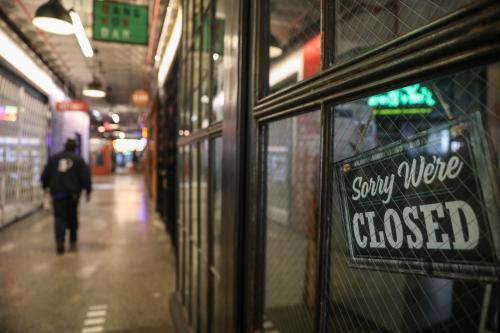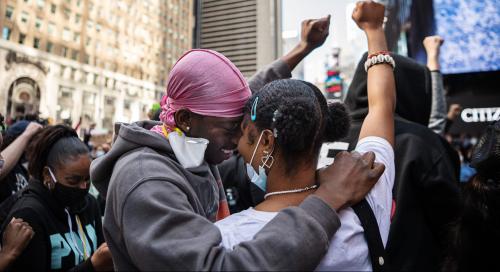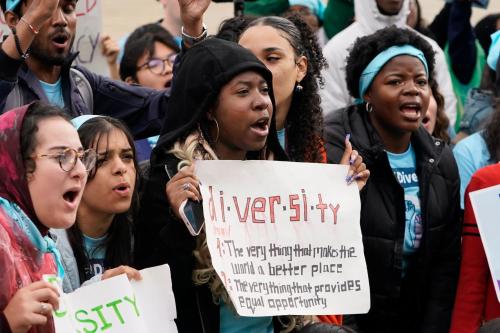If you want more content like this, subscribe to our newsletter.
This week in Class Notes:
-
- Raj Chetty and colleagues have built a publicly available platform that tracks economic activity at a granular level in real time.
- DelCAN and similar programs can increase the use of the most effective reversible methods of contraception.
- COVID-19 has a large, negative effect on the experience of college students, with low-income students being hit the hardest.
- Our top chart shows that more than 50 years after redlining was outlawed, Black Americans continue to own homes at significantly lower rates than whites.
- Thomas Edsall speaks to various experts about America’s low-wage epidemic.
- Finally, check out Tiffany Ford, Sarah Reber, and Richard Reeves’ new piece “Race gaps in COVID-19 deaths are even bigger than they appear” examining disparities in COVID-related deaths by race.
How did COVID-19 and stabilization policies affect spending and employment?
Macroeconomic policy decisions are often made on the basis of data collected from recurring federal surveys of households and businesses. These data have two limitations that have become apparent during the COVID-19 pandemic – they are often available only at a low frequency with a significant time lag, and they typically cannot be used to assess granular variation across geographies or subgroups. Chetty et al. address these challenges by building a new, freely accessible platform that tracks economic activity at a high-frequency, granular level using anonymized data from private companies. The authors use these data to analyze the initial impacts of COVID-19 on people, businesses, and communities. They find that COVID-19 induced high-income households to self-isolate and sharply reduce spending in sectors that require physical interaction. This resulted in losses in business revenue and layoffs of low-income workers at firms that cater to high-income consumers, ultimately reducing their own consumption levels.
Changes to contraceptive method use at Title X clinics following Delaware Contraceptive Access Now
Modern contraception and the Title X program help improve outcomes for women and their children. However, increasing access to contraceptives – particularly the most effective reversible methods – is difficult due to systemic barriers and the imperative of balancing improved access with reproductive autonomy. Delaware Contraceptive Access Now (DelCAN) is a statewide initiative that aims to increase access to the full range of contraceptives for women in Delaware, and particularly to long-acting reversible contraceptives (LARCs). Boudreaux et al. examine the association of DelCAN with changes in contraceptive method use among adult Title X family planning clients. The authors find a 3.2 percentage-point increase in LARC use relative to other states following the implementation of the program.
The impact of COVID-19 on student experiences and expectations
The COVID-19 outbreak has impacted nearly every sector of our society, and higher education is no exception. Aucejo et al. study the effect of the pandemic on the student experience by surveying approximately 1,500 students at Arizona State University, one of the largest public universities in the United States. The authors find that 13% of students have delayed graduation due to COVID-19, 40% have lost a job or internship, and 20% expect to earn less at age 35. These effects are highly heterogeneous and follow existing socioeconomic divides – low-income students are 55% more likely to have delayed graduation due to COVID-19 than their higher-income peers.
Top chart
Homeownership is directly linked to wealth and – due to redlining practices in the first half of the twentieth century – Black Americans were largely denied access to it. This week’s top chart shows that more than 50 years after redlining was outlawed, Black Americans continue to own homes at much lower rates than Whites. As a result, the net worth of white households is now 10 times greater than that of Black households.

Choice opinion
“The pandemic has shone a spotlight on the critical importance of low-skill work. As a society, we must choose to value all workers — particularly those who are keeping essential services going right now on the front lines while so many others work remotely in the safety of our homes” says Wendy Edelberg for Thomas Edsall’s piece in the New York Times.
Self-promotion
The COVID-19 pandemic has shone a harsh light on racial inequities in America, particularly with regard to health outcomes. In their new piece “Race gaps in COVID-19 deaths are even bigger than they appear”, Tiffany Ford, Sarah Reber, and Richard Reeves examine racial disparities in COVID-related deaths and demonstrate how race gaps in vulnerability underscore inequities faced by Americans of color in every aspect of their lives.








Commentary
Class Notes: Economic activity amid COVID-19, homeownership and wealth, and more
Wednesday, July 1, 2020